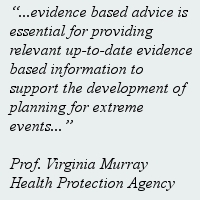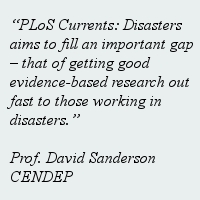Announcing PLoS Currents: Disasters
This blog post originally appeared on Speaking of Medicine March 27.
![]() Today, there are ever more pressing needs for up-to-date information to be quickly available and easily accessible. This has never been more true than in the field of disasters, where slowness in sharing knowledge can be the difference between life or death for thousands of people, or the avoidance or mitigation of catastrophic outcomes for an ecosystem.
Today, there are ever more pressing needs for up-to-date information to be quickly available and easily accessible. This has never been more true than in the field of disasters, where slowness in sharing knowledge can be the difference between life or death for thousands of people, or the avoidance or mitigation of catastrophic outcomes for an ecosystem.
Despite the breadth of technological possibilities available, publishers and scientific journals have not provided adequate solutions for publication during fast moving emergencies. One study, published in 2009 showed that the majority of the epidemiological articles on the SARS epidemic of 2003 were submitted after the epidemic had ended, many several years after – and this for an emergency that lasted just a few months. The UNIDSR has identified that, “the sharing of research findings, lessons learned and best practices” are a priority in its Hyogo Framework for Action 2005-2015.
PLoS is proud therefore to announce the launch of PLoS Currents: Disasters, a new, innovative open-access publication for the rapid communication of new research results and operational analyses derived from the study or management of all types of disasters. All research is citable and permanently archived in PubMed Central as well as indexed in Scopus and PubMed.
 Our primary aim is rapid dissemination to make essential, and in many cases otherwise hard to publish, findings as widely available as possible as quickly as possible, so they can be used and built upon. We have implemented an integrated authoring, editorial, and peer-review system called Annotum, a new publishing platform, which we believe can cut the publishing time down to a few weeks, or even days. Authors directly compose or insert their manuscript in the web-based application and peer review occurs within it. All of the content is published under a Creative Commons Attribution License (CCBY), which means that articles are immediately free to read but more importantly can then be reused in any way, provided that the authors and original sources are attributed correctly.
Our primary aim is rapid dissemination to make essential, and in many cases otherwise hard to publish, findings as widely available as possible as quickly as possible, so they can be used and built upon. We have implemented an integrated authoring, editorial, and peer-review system called Annotum, a new publishing platform, which we believe can cut the publishing time down to a few weeks, or even days. Authors directly compose or insert their manuscript in the web-based application and peer review occurs within it. All of the content is published under a Creative Commons Attribution License (CCBY), which means that articles are immediately free to read but more importantly can then be reused in any way, provided that the authors and original sources are attributed correctly.
PLoS Currents is a flexible publishing channel, which responds to the particular needs of the community of disasters-related researchers and practitioners. In addition to the decreased publishing time through a streamlined review and production process, it offers:
- Flexibility: open article formats to reflect the diverse types of disasters-related research
- Revisions: updated versions of articles that document the latest results or analyses.
The most recent article, from 16 international experts in the fields of research, education, ethics and operational aspects of disaster medical management, highlights a critical issue in disaster management and describes a template for uniform data reporting of acute medical response in disasters.
 PLoS Currents: Disasters is supported by an international group of researchers, practitioners, who serve on its editorial and review board.
PLoS Currents: Disasters is supported by an international group of researchers, practitioners, who serve on its editorial and review board.
Professor Virginia Murray, an Editor for PLoS Currents: Disasters, and the Head of Extreme Events and Health Protection at the Health Protection Agency, said “evidence based advice is essential for providing relevant up-to-date evidence based information to support the development of planning for extreme events – PLoS Currents: Disasters is a valuable publication resource to help to build the information that is so vitally needed for this purpose.”
Professor Mike Clarke, also an Editor for PLoS Currents: Disasters, and the current Chair of the MRC Network of Hubs for Trials Methodology Research and one of the founders of Evidence Aid, said “We are increasingly aware of the problems caused by research not being published in a timely and accessible way, and the damage this does to decision making and, consequently, to health care and health. The arrival of PLoS Currents: Disasters will help ensure that we learn from those lessons, by improving access to the knowledge needed in disasters. Evidence Aid is trying to make it easier for people to use systematic reviews of relevant information, and this new resource is a landmark step in making this information available.”
Fabrice Renaud, Head of the Environmental Vulnerability and Ecosystems Services Section, United Nations University Institute for Environment and Human Security, Bonn, Germany and an Editor of PLoS Currents: Disasters said: “PLoS Currents: Disasters will enable scientists and practitioners who directly work on the many facets of disaster prevention, disaster management and disaster response to rapidly share their on the ground expertise, observations and research results with a wide range of stakeholders.
Professor David Sanderson, Director, Centre for Development and Emergency Practice (CENDEP) and an Editor of PLoS Currents: Disasters said: “PLoS Currents: Disasters aims to fill an important gap – that of getting good evidence-based research out fast to those working in disasters.”
PLoS Currents started with its first section, Influenza, in 2009. Today, we continue the spirit of innovation with the launch of our sixth and newest member, PLoS Currents: Disasters, which we will be developing over the next few months. Contact us at disasters@plos.org with any questions, comments, or suggestions on further developments or leave a comment below.
PLoS Currents: Disasters welcomes your submissions.

